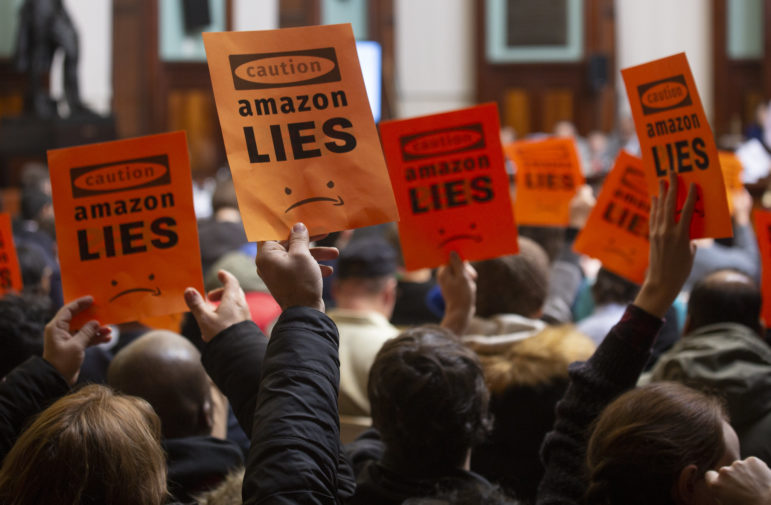“As Amazon gets richer, workers are waiting for protections they needed yesterday, and the state has an important role to play. Gov. Hochul can demonstrate her leadership and prove that she will fight for working people. The first step is signing the Warehouse Worker Protection Act.”

NYC Council/John McCarten
Protestors hold signs during a 2019 City Council hearing on the Amazon headquarters proposal.Four years ago, Amazon set its sights on New York as the new headquarters for its ever-expanding empire. Then-CEO Jeff Bezos was drawn to a world class city with a workforce of innovators, but the deal was made even sweeter by the lure of $3 billion in taxpayer-funded subsidies.
Many New Yorkers were enraged that our city would give away precious resources to one of the richest companies in the world while our city’s infrastructure suffered. And although Amazon promised thousands of new jobs, we knew that their predatory model would drive down area wages and working conditions and displace longtime residents.
So we did something about it. ALIGN and our grassroots #NoAmazon coalition came together to organize with the Queens community, and in 2019, we defeated Amazon and their shameless land grab. But that feels like a lifetime ago.
Since then, we’ve endured a global pandemic and unprecedented threats to our democracy. Daily life in New York feels increasingly untenable for anyone outside the ruling class as our crises intersect and multiply. Rent is through the roof and the homelessness crisis intensifies. Everyday essentials have never been more out of reach, as inflation surges and global supply chain issues cause shortages of formula, tampons, and who knows what next. All the while, our never-ending health crisis persists but corporations like Amazon continue making billions on the backs of their workers and our communities.
The pandemic exacerbated economic inequality in New York as corporate giants rapidly increased their profits, expanded their footprints, and stifled competition, widening the gap between corporate monopolies and small- and medium-sized businesses.
After our HQ2 win, Amazon nearly doubled their New York state facility network, growing from 40 to 78 locations in the past two years and landing in neighborhoods where they not only dominate labor and product markets, but raise area rents, leaving tenants and small businesses vulnerable. In that same period, Amazon has received a whopping $236,314,572 in subsidies from New York State while tripling their profits last year. But their abusive and anti-competitive practices go unpunished, allowing their monopoly to grow more powerful.
This is why we urgently need updated anti-monopoly laws to even the playing field. In New York, legislation like the 21st Century Antitrust Act can strengthen our outdated and weakened antitrust laws to protect consumers, workers, and small businesses from Amazon, Big Tech, and other abusive corporations. And at the federal level, bills like the American Innovation and Choice Online Act and the Competition and Antitrust Law Enforcement Reform Act can prevent mega mergers and self-preferencing that stifle competition.
When companies enjoy a monopoly, they also set the standard for wages and working conditions. Amazon’s exploitative practices are no secret—research shows that the rate of serious injury at Amazon facilities in New York is 40 percent higher than at non-Amazon facilities statewide. And as Amazon has expanded in our state, they’ve driven down wages for warehouse and delivery workers to the tune of $6,000 annually. But Amazon continues to ignore workers’ needs to line their pockets.
Workers are fighting back, and have seen crucial victories this year. The Amazon Labor Union (ALU) won their election at Staten Island’s JFK8 warehouse, the first union Amazon facility in the nation. And the Warehouse Worker Protection Act (WWPA), which my organization helped pass with a mighty coalition of unions and advocacy groups, brings transparency to secret quotas in the warehouse industry and ensures workers at companies like Amazon know their rights.
This was a big win, and we can build on it by creating injury prevention programs that design warehouses to protect workers first. Now, we just need Gov. Kathy Hochul’s signature to make the WWPA law.
July 12-13 marks Amazon Prime Day, marketed as two days of exclusive deals for members that will lead to millions of new orders. But that means a huge influx of orders will need to be fulfilled and delivered within Amazon’s unreasonable two-day turnaround, further increasing the risk of injury, and workers will again pay the price for Amazon’s profit.
As Amazon gets richer, workers are waiting for protections they needed yesterday, and the state has an important role to play. Gov. Hochul can demonstrate her leadership and prove that she will fight for working people. The first step is signing the Warehouse Worker Protection Act; let’s get it done on Prime Day and send Amazon the message that New York stands up for its workers.
Next we must put pressure on Amazon to recognize the ALU and begin negotiations in good faith. And for the long-term, we need a corporate accountability plan that invests in economic resiliency for workers, consumers, and small businesses, ensuring that all New Yorkers don’t just survive but thrive.
Maritza Silva-Farrell is executive director of ALIGN, a labor and climate advocacy organization.









One thought on “Opinion: Gov. Hochul, Hold Amazon Accountable this Prime Day”
Your views are short sighted. Amazon can close up shop and leave all those union workers unemployed. You’d be better served to force politicians to cut taxes then to prevent companies from making profits. It’s employment at will! If employees don’t like their jobs, quit.